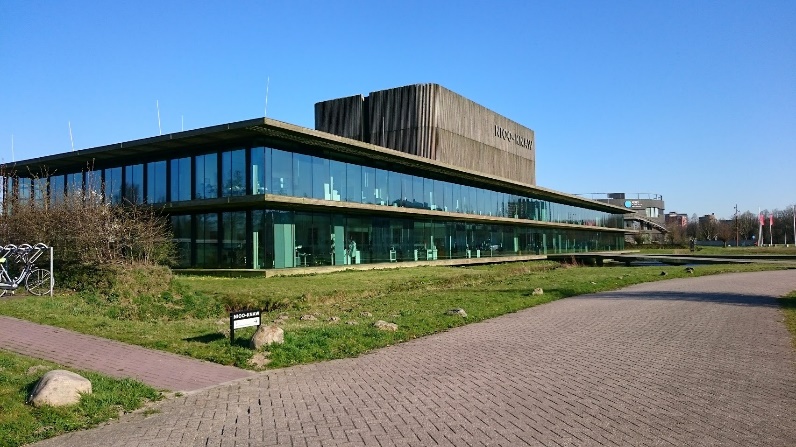1. About the Netherlands Institute of Ecology
Starting in March 2017, I spent 6 months doing a research internship at the Netherlands Institute of Ecology (NIOO) to collect data for my Master’s thesis project. The NIOO consists of a diverse group of over 300 researchers and students who study the major themes of animal, plant, and microbial ecology in terrestrial and freshwater environments. For my work, I was involved with collecting song bird data for the Licht Op Natuur project, which is a long-term experiment examining the effects of nocturnal artificial light on various aspects of the ecosystem. One of the goals of the project is to use the obtained knowledge to better inform the application of nature friendly lighting.
Working at the NIOO has been an extremely rewarding and collaborative experience. The atmosphere of the department is very relaxed and welcoming, while you can see that everyone has a commitment to producing high quality work. There is also a sense that everyone’s opinions and ideas are valued, regardless of where you fit in the hierarchy in the company. These characteristics are quite evident in the many collaborative and “team building” events that are a part of the regular schedule at the NIOO.
2. Research Experience
During my time at the NIOO I gained valuable experience gathering bird data in the field, developing experimental designs, working with GPS and radio telemetry equipment, and conducting statistical analyses. My main responsibilities during the field season involved checking bird nest boxes to note the status of the nest, taking measurements and ringing both adult birds and chicks. I was able to develop practical animal handling skills by learning standard trapping and blood sampling procedures. In addition, I helped to set-up and run several scientific experiments on nesting great tits (Parus major). This involved deploying temperature sensors to track the incubating behaviour of adults, fitting adult birds with transponder tags to track their movement in and out of the nest box, and setting up a radio receiver system to track the detailed movements of adult birds.
In addition to the practical field skills I obtained, I was also able to develop skills relating to experimental design by creating a research proposal for my master’s thesis project, and then implementing and adapting this proposal for real world application. After field data collection, it was my responsibility to organize, process, and analyze the data pertaining to my Master’s thesis. Through this, I was able to further my knowledge of statistical software such as Matlab and R, and learn how to handle large datasets. Overall, I was able to be involved with the initial design of an ecological experiment, learn the methodology to properly collect the data, analyze this data, and write a comprehensive report of the findings, all while receiving helpful and critical feedback from my supervisor and other members of the department.
3. Wageningen and the Netherlands
 Wageningen is a municipality in the central Netherlands well known for its university specializing in Life Sciences and international student community. It is extremely easy to communicate with people here as almost everyone, especially students, is proficient in English. It can be challenging to find accommodation here because so many people are coming to study, so start searching early. The town itself is quite small, and you can easily get to university or work from anywhere by bike. Many used bikes or household items can be obtained by joining student groups on Facebook. Everyone is very friendly and willing to help out new people, especially since so many are from abroad and just arrived themselves.
Wageningen is a municipality in the central Netherlands well known for its university specializing in Life Sciences and international student community. It is extremely easy to communicate with people here as almost everyone, especially students, is proficient in English. It can be challenging to find accommodation here because so many people are coming to study, so start searching early. The town itself is quite small, and you can easily get to university or work from anywhere by bike. Many used bikes or household items can be obtained by joining student groups on Facebook. Everyone is very friendly and willing to help out new people, especially since so many are from abroad and just arrived themselves.


Neueste Kommentare